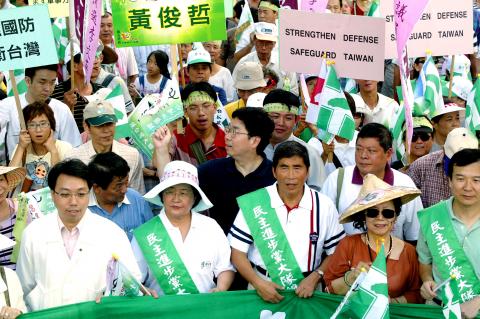Former Democratic Progressive Party (DPP) legislator Chai Trong-rong (蔡同榮), who died early yesterday morning due to multiple organ failure, was a driving force behind the pro-Taiwan Independence movement, making such efforts his life’s greatest goal.
Born in 1935 from a family heavily involved in politics in Chiayi County, Chai graduated from National Taiwan University and went on to receive his PhD from the University of Southern California. He later worked as a political science professor at the City University of New York.
His pro-Taiwan Independence stance caused him to be blacklisted by the then-Chinese Nationalist Party (KMT) regime, resulting in Chai being unable to return to Taiwan for more than 20 years.

Photo: Lin Cheng-kung, Taipei Times
During his time in the US, Chai worked to spread the idea of Taiwanese independence, becoming the first chairman of the Taiwanese Independence League and the Formosan Association for Public Affairs (FAPA), which he co-founded.
Apart from advocating that Taiwan retain the same allotment of immigrants to the US — 20,000 people — as other countries, Chai drew the US Congress’ attention to the state of democracy and human rights in Taiwan and managed to persuade US legislators to support weapons sales to Taiwan.
It could be said that Chai was a major influence behind US legislators’ support of Taiwan.
Since his return to Taiwan in 1990, Chai devoted himself to promoting the use of referendums in the legislative decision process on public issues and supported public decisionmaking on issues by which they would be affected.
Chai also founded Taiwan’s first local television channel in an effort to break the totalitarian control of the then-KMT government over the media, making Formosa TV a symbol the emergence of free speech and relaxing regulations on TV channels.
Although he drew criticism for founding a TV channel while serving as a member of the DPP’s Central Standing Committee — something the DPP had often criticized the KMT for as a way of censoring free speech — most felt that it did not negate his positve actions.
Chai was often seen at pro-localization rallies and activities and was most fervent in his efforts to strengthen Taiwanese identity and attempts to nurture the growth of pro-local individuals.
A solid pro-Taiwan Independence member within the party, Chai had been adamantly opposed to Beijing for its unyielding stance on the use of force to resolve the cross-strait issues. His passing before seeing his efforts come to fruition has greatly saddened many who had fought alongside him in Taiwan’s democracy movement.
Translated by staff writer Jake Chung

Taipei has once again made it to the top 100 in Oxford Economics’ Global Cities Index 2025 report, moving up five places from last year to 60. The annual index, which was published last month, evaluated 1,000 of the most populated metropolises based on five indices — economics, human capital, quality of life, environment and governance. New York maintained its top spot this year, placing first in the economics index thanks to the strength of its vibrant financial industry and economic stability. Taipei ranked 263rd in economics, 44th in human capital, 15th in quality of life, 284th for environment and 75th in governance,

Greenpeace yesterday said that it is to appeal a decision last month by the Taipei High Administrative Court to dismiss its 2021 lawsuit against the Ministry of Economic Affairs over “loose” regulations governing major corporate electricity consumers. The climate-related lawsuit — the first of its kind in Taiwan — sought to require the government to enforce higher green energy thresholds on major corporations to reduce emissions in light of climate change and an uptick in extreme weather. The suit, filed by Greenpeace East Asia, the Environmental Jurists Association and four individual plaintiffs, was dismissed on May 8 following four years of litigation. The

A former officer in China’s People’s Liberation Army (PLA) who witnessed the aftermath of the 1989 Tiananmen Square massacre has warned that Taiwan could face a similar fate if China attempts to unify the country by force. Li Xiaoming (李曉明), who was deployed to Beijing as a junior officer during the crackdown, said Taiwanese people should study the massacre carefully, because it offers a glimpse of what Beijing is willing to do to suppress dissent. “What happened in Tiananmen Square could happen in Taiwan too,” Li told CNA in a May 22 interview, ahead of the massacre’s 36th anniversary. “If Taiwanese students or

The New Taipei City Government would assist relatives of those killed or injured in last month’s car-ramming incident in Sansia District (三峽) to secure compensation, Mayor Hou You-yi (侯友宜) said yesterday, two days after the driver died in a hospital. “The city government will do its best to help the relatives of the car crash incident seek compensation,” Hou said. The mayor also said that the city’s Legal Affairs, Education and Social Welfare departments have established a joint mechanism to “provide coordinated assistance” to victims and their families. Three people were killed and 12 injured when a car plowed into schoolchildren and their